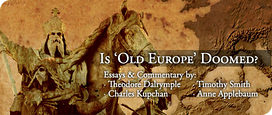There is multiculturalism and then there is multiculturalism. The type alluded to by Theodore Dalrymple is of course an extreme example. I’m not sure if I’m aware of anyone getting stoned in Canada.
But back to multiculturalism. In the Canadian definition, multiculturalism simply means that we celebrate our ethnic diversity, we welcome immigrants with open arms, and say to them: venez, enrichissez-vous (and -nous, too).
We can do this because we believe in the future, we have a dynamic economy with very little long-term, structural unemployment, and we have very little to “lose.” Unlike French language and culture chauvinists, English Canadians don’t view culture as a pure, sealed vessel.
It’s easier for me, an English Canadian, to take such an approach; after all, like most of my compatriots, I have a very weak sense of national identity. My roots are weak, I have no Racine to revere, and poutine (french fries with cheese curds) isn’t exactly Roquefort. The terroir of the Niagara Peninsula is… well….
France and other European nations have a more difficult time accepting the idea of cultural diversity because they have long, established, written cultures, preserved by urban institutions for hundreds and hundreds of years. These are nations with rich histories. They see no reason to “relativize” their national pasts in order to please newcomers.
The root of Europe’s problems is in fact structural unemployment. I think that the French would become a bit more tolerant if they had to: if the economy were moving at full steam, companies would hire people regardless of their ethnic background.
One final comment on multiculturalism: to be sure, it can be taken to extremes, as any movement can. But what, I ask, is wrong with enunciating the following type of vision to newcomers:
You have a past too, and we won’t require you to deny it. We can strive toward a national culture which, on the one hand, pays due respect to the national values which made this country what it is today, but which also respects difference, and does not ask immigrants to pretend that they have no roots of their own?
After all, there’s a reason why we in the rich world admit immigrants, and the least we can do is show a little respect. There is no harm in that.
As long as the fundamental laws of the land—in Canada, the Charter of Rights and Freedoms—are respected, what is the harm in being a tolerant society? One might respond: multiculturalism is a myth. Perhaps. But a useful one, in that it puts an admirable ideal in our sights and it gives us a sense of hope. Before immigrants to Canada are considered equal in the economic sense (this of course takes a generation or two, usually), they are already considered equal in the theoretical and political sense.
The one may help lead to the other. Multiculturalism will never win everyone over, but consider the complete opposite—ethnic nationalism. Is this what we want? We know where that road leads…
Finally, a few parting shots at the French model, as I sit in the Roissy aiport. French opponents of multiculturalism charge that it will lead to ethnic ghettos. And there are no ethnic ghettos today? Both taxi drivers I spoke to, on the way in and the way out, were of immigrant origins. Both of them told me how they feel unwelcome. Both hate French politicians, of all stripes. Both railed against the law outlawing religious symbols. And both predicted that there will be more riots. I heard the same thing in the suburbs, where I was on a radio show hosted in a café.
The French model is grounded in an ideology so profound it can’t see beyond its nose, and it allows elites to remain oblivious to the reality on the ground. France is living proof that a multicultural society (demographically speaking, that is) which denies this reality, does so at the risk of social peace. Beyond this concern, wouldn’t all the devotees of Adam Smith out there be more inclined—shouldn’t they be—to embrace a more cosomopolitan, individualist view of social identity? It’s ironic, but true: multiculturalism strengthens individualism, insofar as it works in the direction of respecting difference. Ethnic nationalism, by contrast, works in favor of the group, at a terrible cost to individualism. Ethnic nationalism has a far bloodier past than multiculturalism.

